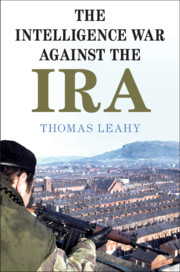Book contents
- The Intelligence War against the IRA
- The Intelligence War against the IRA
- Copyright page
- Dedication
- Contents
- Acknowledgements
- Abbreviations
- Introduction
- Part I The Intelligence War: August 1969 to July 1972
- Part II On the Verge of Defeat? The Intelligence War: July 1972 to December 1975
- Part III The Struggle to Contain the IRA: January 1976 to April 1998
- 7 British Political, Military and Intelligence Strategy towards the IRA: 1976–1998
- 8 The Intelligence War against the IRA in Belfast and Derry City, January 1976 to August 1994
- 9 The Intelligence War against the IRA in Rural Areas and England and the IRA Leadership, January 1976 to August 1994
- 10 ‘It’s the Primacy of Politics That’s Important’: Alternative Reasons for the IRA’s Ceasefires in August 1994 and July 1997
- Conclusion
- Book part
- Notes
- Bibliography
- Index
8 - The Intelligence War against the IRA in Belfast and Derry City, January 1976 to August 1994
from Part III - The Struggle to Contain the IRA: January 1976 to April 1998
Published online by Cambridge University Press: 05 March 2020
- The Intelligence War against the IRA
- The Intelligence War against the IRA
- Copyright page
- Dedication
- Contents
- Acknowledgements
- Abbreviations
- Introduction
- Part I The Intelligence War: August 1969 to July 1972
- Part II On the Verge of Defeat? The Intelligence War: July 1972 to December 1975
- Part III The Struggle to Contain the IRA: January 1976 to April 1998
- 7 British Political, Military and Intelligence Strategy towards the IRA: 1976–1998
- 8 The Intelligence War against the IRA in Belfast and Derry City, January 1976 to August 1994
- 9 The Intelligence War against the IRA in Rural Areas and England and the IRA Leadership, January 1976 to August 1994
- 10 ‘It’s the Primacy of Politics That’s Important’: Alternative Reasons for the IRA’s Ceasefires in August 1994 and July 1997
- Conclusion
- Book part
- Notes
- Bibliography
- Index
Summary
This chapter explores the intelligence war’s impact on the IRA in its urban heartlands of Belfast and Derry City between 1976 and 1998. In Belfast, there was a decline in IRA attacks during this period, partly as a result of infiltration and surveillance. Nonetheless, I argue that there was also a decline in IRA attacks, primarily because of the need to avoid civilian casualties occurring on a regular basis, in order to sustain Sinn Féin’s vote. By the 1990s, the Belfast Brigade had recommenced a commercial bombing campaign that would cause extensive financial damage and necessitate the continuation of security installations and patrols. In Derry City, the IRA’s campaign was more of a persistent nuisance by 1994. But this decline was not because of the intelligence war. Rather, it was largely that the SDLP had begun rebuilding the city for nationalists. The IRA risked a decline in electoral support if they attacked the city infrastructure again. The evidence provided does not suggest that the Belfast and Derry City IRA Brigades called a prolonged ceasefire in August 1994 primarily because of the intelligence war. Chapter 8 also debates the impact of suspected agents and informers on the Belfast and Derry City IRA, including the Stakeknife and Raymond Gilmour cases.
- Type
- Chapter
- Information
- The Intelligence War against the IRA , pp. 138 - 163Publisher: Cambridge University PressPrint publication year: 2020



